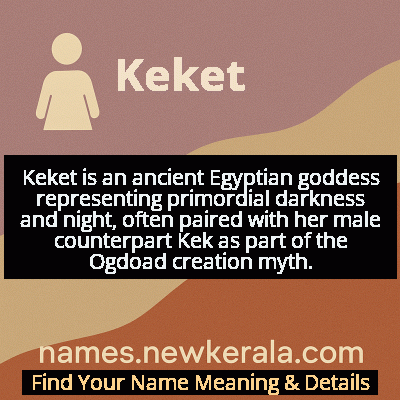Keket Name Meaning & Details
Origin, Popularity, Numerology Analysis & Name Meaning of Keket
Discover the origin, meaning, and cultural significance of the name KEKET. Delve into its historical roots and explore the lasting impact it has had on communities and traditions.
Name
Keket
Gender
Female
Origin
Egyptian
Lucky Number
7
Meaning of the Name - Keket
Keket is an ancient Egyptian goddess representing primordial darkness and night, often paired with her male counterpart Kek as part of the Ogdoad creation myth.
Keket - Complete Numerology Analysis
Your Numerology Number
Based on Pythagorean Numerology System
Ruling Planet
Neptune (Ketu)
Positive Nature
Intuitive, analytical, spiritual, and inquisitive.
Negative Traits
Secretive, reserved, aloof, and can be overly critical.
Lucky Colours
Green, yellow.
Lucky Days
Monday.
Lucky Stones
Cat’s eye, moonstone.
Harmony Numbers
1, 5, 6.
Best Suited Professions
Scientists, researchers, spiritual leaders, detectives.
What People Like About You
Depth of knowledge, analytical skills, spirituality.
Famous People Named Keket
Keket (Mythological)
Egyptian Goddess
Primordial deity representing darkness and night in Egyptian cosmology
Keket Sobekneferu
Egyptian Priestess
Preserved ancient rituals and temple traditions as high priestess
Keket Amunet
Royal Scribe
Maintained sacred texts and documented night deity rituals
Name Variations & International Equivalents
Click on blue names to explore their detailed meanings. Gray names with will be available soon.
Cultural & Historical Significance
In temple rituals and creation myths, Keket played a crucial role in maintaining cosmic balance. Her presence acknowledged that darkness was as essential as light, night as important as day, and the unknown as valuable as the known. Egyptian artisans often depicted Keket as a woman with a frog head or as a serpent, symbols of fertility and regeneration that emphasized darkness's creative aspects. Modern understanding of Keket reveals the sophisticated Egyptian worldview that embraced duality and recognized darkness as a protective, nurturing force essential to the cycle of life, death, and rebirth.
Extended Personality Analysis
Those named Keket often embody the paradoxical qualities of their namesake goddess—they are both mysterious and profoundly insightful, private yet deeply perceptive. Like the protective darkness Keket represents, they tend to be excellent listeners and keepers of confidence, creating safe spaces where others can be vulnerable. Their intuitive nature allows them to understand underlying dynamics and unspoken truths, making them valuable advisors and friends. They typically possess a quiet strength that emerges most powerfully during challenging times, much like how night provides rest and regeneration.
Keket-named individuals often display remarkable comfort with ambiguity and complexity. They understand that not everything needs immediate explanation or resolution, and they trust processes that unfold in their own time. This makes them particularly suited to creative endeavors, psychological work, or any field requiring patience with unfolding mysteries. Their relationship with 'darkness' as a concept tends to be positive—they see it as a space of potential rather than absence. This perspective often makes them innovators who can envision possibilities where others see only voids, and healers who can guide others through difficult transitions with wisdom and compassion.
Modern Usage & Popularity
In contemporary naming practices, Keket remains an exceptionally rare choice that appeals to specific demographics. The name has found particular resonance among families with Egyptian heritage, mythology enthusiasts, academics specializing in ancient cultures, and parents seeking unique names with profound symbolic meaning. While it doesn't appear on standard baby name rankings, its usage has seen a modest increase in recent years alongside growing interest in mythological and archaeological names. Modern bearers of the name often appreciate its connection to primordial feminine power and its representation of darkness as a creative, protective force. The name's rarity makes it distinctive without being unfamiliar to those with knowledge of Egyptian mythology. Its modern appeal lies in its combination of ancient significance, unique sound, and the positive reinterpretation of darkness as a concept—aligning with contemporary interests in shadow work, intuition development, and reclaiming misunderstood aspects of feminine divinity.
Symbolic & Spiritual Meanings
Keket's symbolic meanings extend far beyond literal darkness to encompass profound metaphysical concepts. She represents the fertile void—the creative potential that exists before manifestation, the quiet space where ideas gestate and possibilities form. This makes her a symbol of infinite potential and the mystery of beginnings. Her darkness is not empty but full—teeming with unrealized creation, much like a seed in soil or a thought before expression. In psychological terms, Keket symbolizes the collective unconscious, dreams, intuition, and the shadow self—those aspects of personality and experience that remain outside conscious awareness but profoundly influence our lives.
Metaphorically, Keket teaches the value of embracing the unknown and trusting processes that occur outside direct observation. She represents the wisdom found in silence, the insights gained in darkness, and the transformation that happens when we stop striving and allow natural cycles to unfold. Her symbolism reminds us that just as plants grow roots in darkness before emerging into light, human growth often requires periods of inward focus and apparent inactivity. In a world that often privileges visibility and constant activity, Keket's symbolic presence affirms the creative power of receptivity, patience, and trust in processes we cannot fully see or control.

